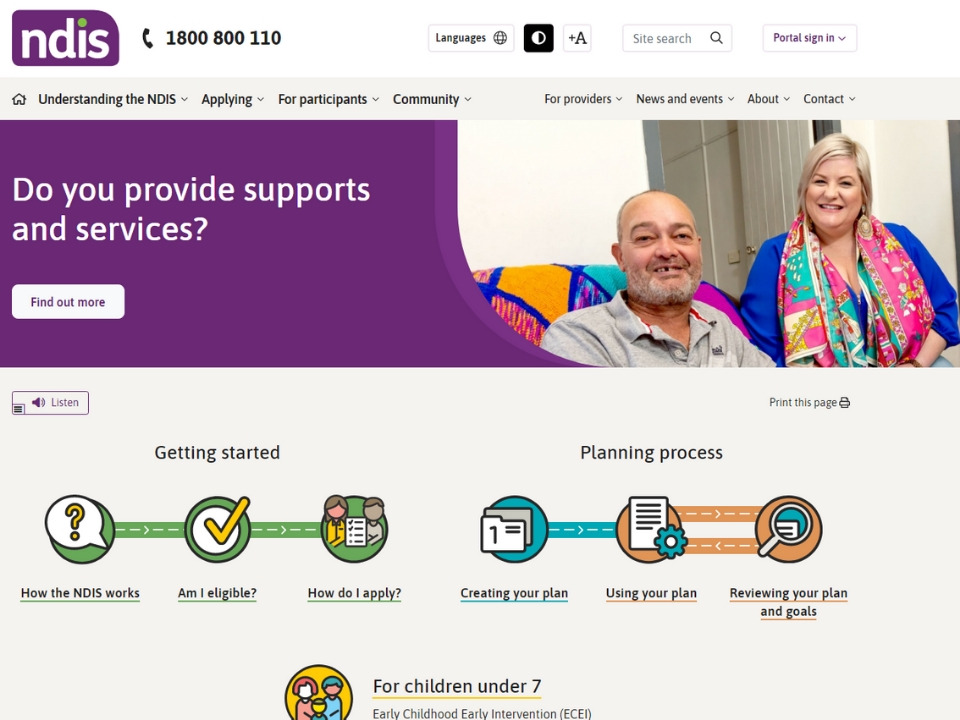Financial support and funding for autistic people
The Australian Government provides a range of financial supports for children, teenagers and adults on the autism spectrum, and their parents and allies.
This financial support may be accessed during the diagnostic phase, or once a diagnosis has been confirmed.
To access financial support, you will have to apply for funding schemes – they will not be granted to you automatically when you or your child is diagnosed.
Some funding schemes will only require you to provide proof of diagnosis, whilst other funding schemes will require you to explain why you, or your child, needs extra financial help.
Eligibility requirements for funding may vary, so you or your child might qualify for support under one scheme, but not another. Some schemes (or services) may also have limited funding, as such you may be put on a waiting list.
Below is a summary of the financial support services available for autistic people, provided by the Australian Government.
The National Disability Insurance Scheme (NDIS)

The National Disability Insurance Scheme (NDIS) is the way that people with disabilities are being financially supported in Australia. It is managed by the National Disability Insurance Agency (NDIA).
The NDIS works on an individual basis with people who have been diagnosed with a disability or disorder, or who are suspected as having a disability or disorder, to determine a funding plan for reasonable and necessary support. Some supports may also assist the carers of people with a disability or disorder.
Launched in stages from July 2013, the NDIS is now available across Australia.
If you or your child is autistic, the NDIS may be able to support you to gain access to services and support in your community. It can also provide funding for early intervention or early support therapies, or one-off items such as wheelchairs or assistive technologies in some circumstances.
There is no minimum funding under the NDIS and the funding allocated to each participant varies based on an individual’s needs. Some people with an autism diagnosis may not qualify for financial support under the NDIS.
There are eight outcome domains in the NDIS Framework, including funding to assist with:
- Daily Living
- Work
- خانه
- Social and Community Participation
- Health and Wellbeing
- Relationships
- Lifelong Learning
- Choice and Control
If you or your child receive an NDIS plan, it will outline your (or their) goals and aspirations in relation to these outcomes. Being part of the NDIS means you or your child will get access to the support you need to meet these goals, regardless of your situation or diagnosis.
To determine whether you or your child is eligible, you can complete a checklist on the NDIS website. If you meet the criteria, you can find out how to become a participant on the website.
National Early Childhood Program
The National Early Childhood Program (NECP) under the NDIS, aims to support children with disability, including autism.
It provides support for the child, their parents or carers and connects families with resources.
Individualised support for children with disability or developmental delay may be available through the NDIS and you are encouraged to contact the NDIS, your Early Childhood partner or the NDIS National Call Centre on 1800 800 110 for more information


Medicare
Medicare is Australia’s universal health care scheme. It guarantees all citizens access to a wide range of health services at little or no cost.
The Chronic Disease Management Plan, the Better Access to Mental Health Plan and Helping Children with Autism (HCWA) are all Medicare plans designed to support autistic people.
The Medicare Safety Net can help with high out-of-pocket costs for some Medicare services.
Chronic Disease Management
Autistic people may be able to access support through the Chronic Disease Management Plan, because autism is considered to be a chronic (or lifelong) condition.
Through the plan, your GP will be able to refer you or your child to allied health professionals (like psychologists, speech pathologists, occupational therapists, dietitians or podiatrists) for up to five sessions per year, that you can claim at the Medicare rebate.
Better Access to Mental Health
The Better Access to Mental Health Plan provides you or your child with up to 10 sessions per year with mental health professionals – like psychologists, mental health occupational therapists and some social workers – using the Medicare rebate. This referral can be accessed through your GP.
Group sessions – such as a social skills group or emotion regulation groups – can also be claimed under this plan, but you will need to check whether Medicare covers them first.
Helping Children with Autism treatment plan
Once your child has been diagnosed with autism, the Helping Children with Autism treatment plan can provide you with Medicare rebates for up to 20 (once off support) sessions with therapists like psychologists, speech pathologists and occupational therapists.
There is also a HCWA assessment plan with can be used before or after diagnosis for assessment sessions with speech therapists, occupational therapists and psychologists.
To be eligible, your child’s treatment plan must be in place before their 13th birthday, and the sessions must be used before they turn 15. This referral can be made through a paediatrician or psychiatrist.
The Medicare Safety Net
The Medicare Safety Net has been designed to help manage the high out-of-pocket costs of some Medicare services. Once you’ve spent a certain amount on approved services in a calendar year, you may be able to get extra Medicare payments for the rest of the year.
Individuals will be notified by Medicare when they approach the need for the safety net, but families will need to register with Medicare so that Medicare knows that they need to tally their medical expenses together.
For more information about Medicare
For more information about Medicare and associated plans, call Medicare on 13 20 11 or visit the Services Australia website.

Centrelink
Centrelink, managed by Services Australia, delivers a range of payments for autistic children or adults, or their parents or carers.
Carer Allowance
The Carer Allowance (child) is a means-tested payment for people who care for children with disability or disorder at home. If you are eligible it is paid as a fortnightly cash payment, and additional one-off payments are also announced from time to time.
Once your child is 16 or older, you can arrange to swap to a Carer Allowance (adult).
Carer Payment (child)
The Carer Payment (child) is a means-tested payment for those who cannot support themselves, because they’re caring for a child with a disability or disorder. It is a fortnightly cash payment.
Once your child is over 16, you can arrange to swap to Carer Payment (adult).
Child Disability Assistance Payment
If you are receiving the Carer Allowance for looking after a child with a disability or serious illness, you may be eligible to access the Child Disability Assistance Payment, an automatic yearly payment, as of the 1 July each year.
The payment is $1000 for each eligible child who qualifies for the Carer Allowance.
Carer Supplement
The Carer Supplement is an annual payment of $600 to assist carers with the costs of looking after for a person with a disability or disorder.
To be eligible, you must be receiving the Carer Allowance or the Carer Payment as of the 1 July each year. You do not need to apply for the Carer Supplement – it will automatically be paid to you by Centrelink if you are eligible.
Disability Support Pension
From the age of 16, you or your child may be eligible for the Disability Support Pension. If eligible, the Disability Support Pension provides financial help if autism prevents a person from working.
Centrelink initiative: Health Care Card
When you receive the Carer Allowance, your child will be issued with a Health Care Card. It entitles your child to concession rates for prescription medicines and other concessions like discounted public transport for some cardholders, bulk billing by selected doctors and higher refunds through the Medicare Safety Net.
Centrelink payment: Carer adjustment payment
The Carer Adjustment Payment is a one off payment for children under seven who have a severe illness or a significant disability. If eligible, the maximum payment amount any family can receive is $10,000 for each child. There are several eligibility criteria, and the amount you receive is dependent on your family’s circumstances. The payment is non-taxable.



